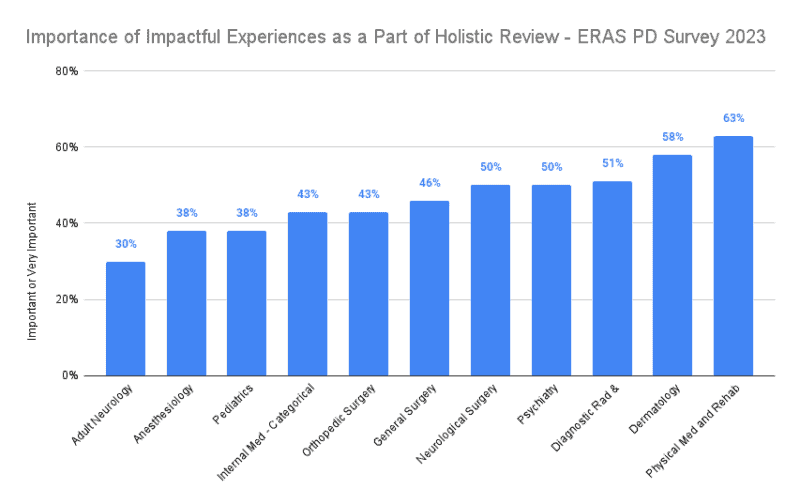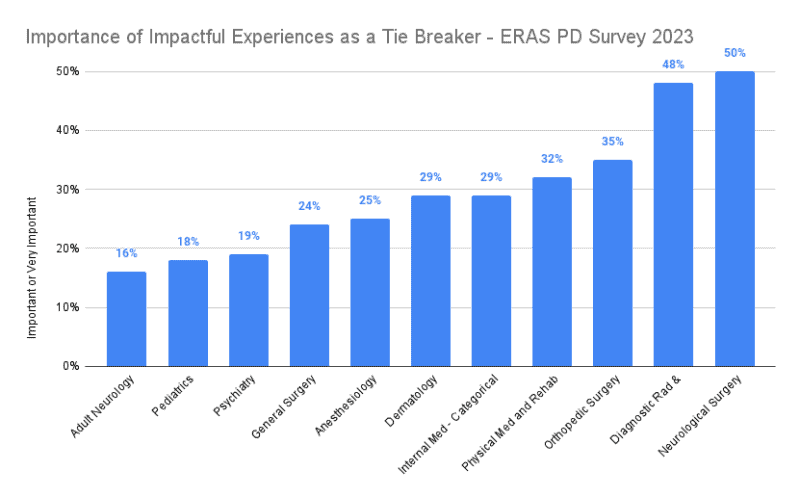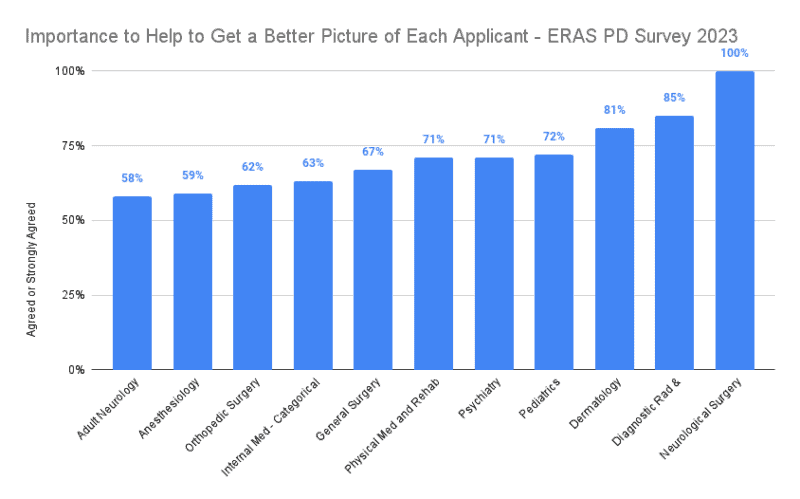
Are you applying to family medicine residencies and worried about how to design your impactful experiences? How do family medicine residencies review impactful experiences? Do you really need to fill in all impactful experience slots in family medicine?
While family medicine didn’t participate in the 2023 Supplemental ERAS Application, we’ll dive into how residencies review impactful experiences in participating specialties and how they can make a significant difference in your journey when they are integrated with family medicine. Look below to find the most important data from the most recent ERAS Program Director survey to learn more!
Table of Contents
What are Impactful Experiences in the MyERAS?
In prior ERAS applications, candidates were required to categorize their experiences into three main sections: work, volunteer activities, and research involvement. For each entry, they were expected to provide details such as start and end dates, time commitment, and a brief description of the experience.
One issue with this system was applicants tended to include an array of unrelated experiences, some of which had little relevance to the field of medicine or their overall application.
The MyERAS application now features a revamped “impactful experiences” section that allows applicants to list up to 10 experiences that best convey their essence and priorities. For each of these experiences, candidates can provide detailed information, including the position title, start and end dates, the experience’s location or setting, and a concise 1020-character description. Among these 10 experiences, applicants can spotlight up to three as their “most meaningful experiences,” accompanied by a brief reflection on how these encounters influenced them.
For more about other important changes to residency applications, check out our guide to Preference Signaling to see the full list of programs and signals available in 2024.
How Did Programs Use Impactful Experiences in 2023?
Revamping impactful experiences seems like a positive change, but did impactful experiences affect how PDs chose which applicants to interview?
How PDs decide who to interview and how they weigh different experiences, attributes, and academic metrics is largely a mystery and different in each program. Standing out can be difficult with so many applications, so can impactful experiences help you stand out?
In the 2022-2023 Supplemental ERAS Program Director Survey, PDs were asked about the importance of impactful experiences at each stage of the application process. You can see how PDs answered below along with the importance of each stage.
| PD ERAS Survey 2023 | N | Not Important % (n) | Somewhat Important % (n) | Important % (n) | Very Important % (n) | Important or Very Important % (n) |
|---|---|---|---|---|---|---|
| As part of a holistic application review to decide whom to interview | 528 | 9% (45) | 45% (224) | 32% (156) | 14% (70) | 46% (226) |
| As a tie breaker in deciding who to interview | 524 | 35% (144) | 37% (154) | 21% (88) | 6% (26) | 28% (114) |
| To prepare for the interview | 526 | 13% (61) | 37% (167) | 35% (162) | 15% (67) | 50% (229) |
| Plan to use during ROL discussion | 521 | 34% (125) | 42% (155) | 19% (71) | 5% (18) | 24% (89) |
| Other | 187 | 54% (29) | 24% (13) | 15% (8) | 7% (4) | 22% (12) |
Impactful Experiences as a Part of Holistic Review
While screening is the first hurdle for most applications, holistic review is where your experiences and application as a whole can be properly evaluated.
We can see a large range of importance according to specialties in the graph below. Adult neurology and anesthesiology were on the lower end of all specialties with only 30% and 38% of PDs surveyed finding impactful experiences to be important or very important as a part of holistic review. A majority of PDs in diagnostic/interventional radiology, dermatology, and physical medicine and rehabilitation found impactful experiences to be important or very important with 51%, 58%, and 63% saying so respectively.

Adult neurology was on the lower end of all residencies
Impactful Experience Importance as a Tie Breaker
When deciding between two equal applicants to interview, no specialties found impactful experiences to be more important as a tie breaker. Again, adult neurology along with pediatrics ranked at the lower end of all residencies with 16% and 18% of PDs finding impactful experiences as important or very important as a tie breaker. Neurologic surgery and diagnostic/interventional radiology were at the top of the specialties surveyed with 50% and 48% respectively.

Neurological surgery was on the upper end of all specialties
Impactful Experience Importance to Understanding an Applicant
For most applicants, the residency application is the only way for programs to understand your motivations and fit into a program’s goals and culture. Your experiences and additional explanation can be a great way for PDs to paint a picture of an applicant.
A majority of all specialties found impactful experiences to be important or very important to get a better picture of each applicant. Adult neurology and anesthesiology were still on the lower end with 58% and 59%. On the other hand, dermatology, diagnostic/interventional radiology, and neurological surgery responded very positively with 81%, 85%, and 100% respectively.

All surveyed neurological surgery PDs found impactful experiences to be important to understanding the applicant
What are the Advantages of Program Signaling?
In MyERAS, the “impactful experiences” section lets applicants share important life events that have shaped their personal and professional growth. This helps them show residency program directors the unique backgrounds, skills, and qualities they bring to the table.
As seen in the data above, most programs and specialties don’t use impactful experiences as a way to screen or choose between candidates. A majority agree that impactful experiences make it easier for program directors to decide if the applicant is a good fit for their program.
Impactful Experience Tips
- Use all 10 slots: Make the most of your application space by listing all 10 experiences to demonstrate your commitment to medicine or showcase life experiences that drove your pursuit of a medical career.
- Diversify your experiences: Include a wide range of experiences, from community service to research, clinical skills, and more. Use the “three most meaningful experiences” section to reflect on how challenges and hardships influenced your journey.
- Present Yourself: The impactful experiences section, along with your personal statement and letters of recommendation, should collectively paint a comprehensive picture of who you are as an applicant and as an individual. Highlight your problem-solving skills and perseverance.
- Know what program directors can see: Understand that program directors can view all selected, most meaningful, and impactful experiences, and organize them by type, chronology, and key characteristics. Most meaningful experiences are shown at the top of this list.
- Avoid repetition: Steer clear of repeating experiences or information found elsewhere on your application to prevent redundancy. You can combine experiences you used elsewhere in the application into one to make a broader point about how those experiences impacted you.
- Find connections: When possible, link impactful experiences with your letters of recommendation to strengthen your application’s credibility.
- Demonstrate desired qualities: Use this section to showcase qualities like teamwork, communication skills, adaptability, and a commitment to patient care.
- Maximize the impact: If a particular experience influenced your choice of medical specialty, provide a detailed explanation of how it shaped your decision.
Conclusion
Impactful experiences are just one of the changes being implemented to help level the playing field for future applicants. While there are more opportunities to list your experiences, it isn’t likely to increase matching chances more than having a well-rounded application. This includes avoiding any failed Step tests and getting the highest Step 2 CK score possible.
If you are feeling overwhelmed, you aren’t alone. We offer free consultations for students to help identify what is them back and how best to break through to help match into their dream residency. If you need to talk, book a consultation today and receive free lectures and Anki cards from the Yousmle Library on the topics students struggle with most!







